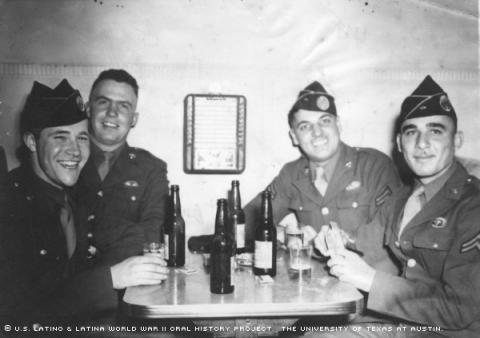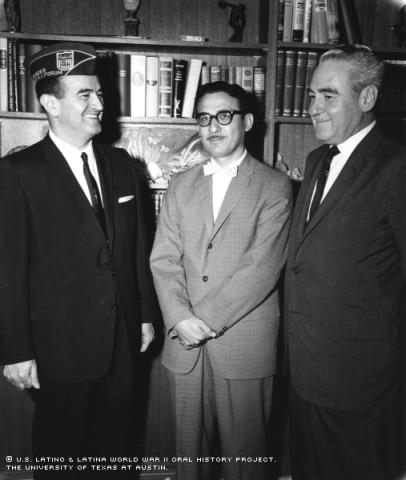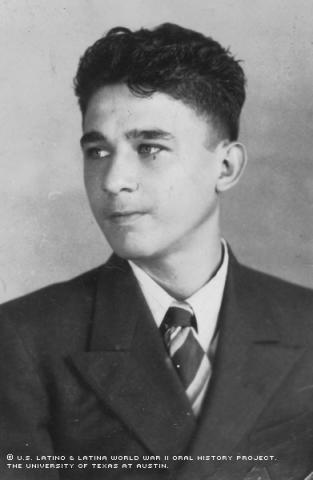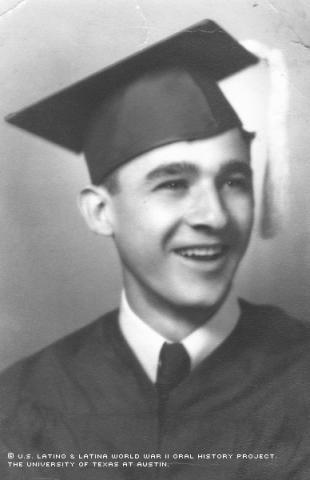



By Stacy Nelson
Post-World War II brought what Virgilio G. Roel termed "The Golden Era" for Mexican Americans.
"With the GI Bill, for the first time in the history of our country, and our ethnic experience, Mexican Americans had the opportunity to attend colleges and universities all over the United States" Roel said.
For more than six decades he was involved in the betterment of the social, labor, economic, educational and political advancement of Mexican Americans, and, later, Latinos in general, as well as other minority men, women and young people.
Roel was inducted into the Army at Fort Sam Houston in San Antonio, Texas, on Nov. 25, 1942. He first served and took basic training with the 84th Infantry Division at Camp Crowder, Texas. He was the only one in his battalion selected for the Army Specialized Training Program, and went to Ohio State University to study geopolitics and languages.
"Initially, I found a lot of prejudice, mainly resentment from white soldiers, especially if a Mexican American soldier got a better assignment because of his intellect. There was also crude discrimination by both commissioned officers and high-rank enlisted men in cases where the Mexican Americans were of a darker complexion,” Roel said.
"On some occasions, I would interfere to speak up for Mexican American and American Indian soldiers. … When I first went and worked in Headquarters Company, where the servicemen's personnel records were kept, I found that the service record of enlisted men with a Mexican American name were labeled 'Mexican,' and those of Anglos were labeled 'White.' I objected strongly and, after several months, the identification of Mexican American soldiers was changed to 'White.'"
When the ASTP program at Ohio State was terminated, Roel was assigned to a communications unit at Camp Crowder in Missouri, where he supervised 12 young telephone operators, members of the Women's Army Corp. Shortly after, anxious to serve his country overseas, Roel volunteered to join the United States Paratroopers.
When Roel arrived at Fort Benning in Georgia for parachute training, he was about 4 pounds under the required weight, so that weekend he ate numerous bananas and drank quarts of milk to meet the weight requirement. After rigorous physical training at Fort Benning, Roel went to Fort Bragg in North Carolina for further training.
From there, Roel's 517th Parachute Infantry Regiment went to an embarkation point in New Jersey, from where they were deployed to the European Theater of Operations, first landing in Liverpool, England, shortly after the Battle of the Bulge. The regiment also served in England, France and Germany. With his unit, Roel served in the Rhineland Central Europe campaign. He earned the EAME Campaign Medal with two Bronze Star medals, as well as the American Theater Medal, World War II Victory Medal and Good Conduct Medal.
In August of 1945, en route to jump in Japan, members of the 517th Parachute Infantry Regiment learned the Japanese had surrendered, after President Harry S. Truman had ordered atomic bombs to be dropped on Hiroshima and Nagasaki. The ship and Roel's unit proceeded to the East Coast of the U.S. Roel was honorably discharged from the Army Paratroopers as a member of Headquarters Company, 2nd Battalion, 517th Parachute Infantry Regiment, on Dec. 27, 1945.
Roel was born in Laredo, Texas, on June 2, 1922, the son of "Profesor" José García Roel and Josefina González Santos de Roel. The family moved to Texas from Guerrero, Tamaulipas, Mexico, one night in 1913, after revolutionaries in the area burned down their home and José’s printing machinery and shop. In the weekly newspaper he published, Roel’s father had recently advocated an end to indiscriminate killings of women and children.
In Laredo, José used his newspaper, "El Fronterizo" as a platform to gain equal rights for all of Laredo's citizens, and espoused the same ideas to the people of Nuevo Laredo, Mexico, where the newspaper also had wide circulation.
Since Roel's mother died in childbirth with her 14th child, at the age of 39, Roel credited his step-mother, Petra Saenz de García Roel, for raising him and the rest of his living siblings.
Roel began working at the age of 8 for a grocery store owner, already logging more than 50 hours for $3.50 a week. A week after his high school graduation in l941, Roel began earning from $40 to $60 a week. His commitment to hard work, combined with a dedication to civil rights and opportunities for Hispanics, would continue throughout his life, much as it had for his father.
Under the GI Bill, Roel attended the University of Texas from 1946 to 1948. In 2 1/2 years, Roel graduated Magna Cum Laude with a degree in international relations. Of 20 Laredo WWII veterans who formed the first contingent to the university in 1946, after the war, all except one obtained their degree in four years or less.
At the university, Roel helped organize the Laredo Club of the University of Texas, which was active in civic affairs. Among other accomplishments, the club challenged Texas Attorney General Price Daniel to reverse an opinion he’d issued that condoned segregation of Mexican American school children based on language. Roel also confronted the governor of Texas and the president of the university on civil rights and racial issues, and carried on such discussions in letters to the "Daily Texan," UT’s newspaper.
On weekends, Roel and other club members traveled to surrounding towns to talk to Mexican American groups on how to organize and qualify to vote in order to fight injustices by politicians against Mexican Americans. During the summer and at the year's end, the Laredo Club held dances in Laredo to raise money to grant local, poor Mexican American high school graduates $100 scholarships to attend UT, where tuition was then $25 per semester. The Laredo Club also had Christmas parties for children at the Laredo orphanage. Members of the club also supported Heman Marion Sweatt, who applied to enroll in UT’s School of Law and was turned down because he was black, a decision later reversed by the U.S. Supreme Court. The Laredo Club also fought housing and other forms of discrimination at the University of Texas from 1946 to 1948.
In September of 1948, Roel hitchhiked to Washington, D. C., eventually receiving his Doctorate of Laws from Georgetown Law School. He passed the Bar exam in D.C. in 1952, and the Texas Bar in 1954. He worked in various volunteer and official capacities advancing the role of Mexican Americans, including co-founding the first national Latino lobbying group, which eventually became "El Congreso." Roel also co-founded the first Hispanic-owned National Bank in the nation's capital in 1974.
In March of 1961, Roel traveled with a delegation to press for the appointment of the first Mexican American as U. S. Federal District Judge. When a resolution seemed unclear, Roel, who along with the others had campaigned for John F. Kennedy for president through "Viva Kennedy" clubs, pushed for an immediate answer from U. S. Attorney General Robert F. Kennedy. Less than two months later, Reynaldo Garza, from Brownsville, Texas, was appointed.
In July of 1962 President John F. Kennedy appointed Roel to serve as Associate Justice of the High Court of American Samoa, a position in which he served until October of 1967. While holding the position, Roel was active in promoting the use of more Native American Samoans as judges, prosecutors and public defenders. He also notes he worked to preserve ownership of land for Samoans only, made certain the U. S. Constitution was respected along with the American flag, worked to improve the conditions of the penal and judicial system, and worked to increase the number of Boy Scouts troops in American Samoa.
Roel is a charter member and an active participant in the American GI Forum, an organization of Mexican American WWII veterans and their families. He also took interest in local, state and federal activities and politics.
Roel also served with the Border Patrol, part of the U. S. Department of Justice’s Immigration and Naturalization Service, in McAllen, Texas, from 1952 to 1954.
In 1954, Roel set up practice in McAllen and Laredo, Texas, and later formed the law firm of Roel, Sanchez and Idar, with law partners Robert P. Sanchez and Eduardo Idar, Jr., both also originally from Laredo.
Despite his accomplishments, Roel says he continued to encounter discrimination, even in his professional life. For example, he says when he attempted to get a $250 loan from a local McAllen bank to make a required advance payment on his office-space rent, he and his first partner, Bob Sanchez, were turned down because the Anglo attorneys in the Rio Grande Valley didn’t want the bank to make loans to Mexican American attorneys. Roel says he had to cash some of the U.S. war bonds he’d purchased during the war to get the money to pay in advance for two months of office rent.
Roel recalls his food budget being tight at first.
"At the beginning, my first law partner and I had a hard time making it, since the Mexican American people in McAllen and along the Valley had very little or no money to invest in lawyers, so at least half of our work was without payment or 'pro-bono,'" he said. "We had to limit ourselves in spending for food. But with time and good word-of-mouth publicity, we began eating better food more regularly," he said.
Roel and his partners organized local people to claim and fight for their civil and political rights, as well as engaged in local, state and national politics. He says they fought for the rights of Mexican American workers, to protect them from exploitation, and to improve their working and economic conditions.
On Oct. 22, 1967, after Roel left his position of Associate Justice, the White House announced the appointment of Roel to the position of General Attorney and Member, Board of Appeals and Review of the U.S. Post Office Department in Washington., D.C. Along with his other duties, Roel was instrumental in selecting, training and advancing numerous women, Mexican Americans, blacks and Puerto Ricans to higher-level positions in the department. He also says he participated in reversing the department's policies of firing postal carriers for wearing facial beards and the firing female employees who got pregnant out of wedlock, even when the woman's husband-to-be was in Vietnam, in cases where the alleged infraction wasn’t directly connected with the duties of the position.
Roel's crusade against discrimination continued when in 1971 the White House announced his appointment as National Director of Conciliation in D. C., which included enforcing Equal Housing Opportunity laws throughout the U.S. and its territories.
"During the '60s and '70s, housing discrimination was rampant all over the United States," Roel said. "Landlords used to advertise apartments for rent and, when a black or a Mexican American showed up to rent it, the apartment owner would refuse to rent it, claiming that it was already rented. That same day, we used to send a white person decoy to go and ask for the same apartment, and the owner would rent it to him or her. That way the owner was caught red-handed and charged with breaking the Equal Housing Opportunity federal law."
In February of 1974, the White House announced the appointment of Roel as the first Mexican American to serve as a member of the Appeals Review Board of the U. S. Civil Service Commission in Washington, D. C. Of the hundreds of decisions in which Roel participated, one he considers a watershed opinion regards the hiring practices of law enforcement agencies, and led to the elimination of barriers against Latinos in obtaining employment with the Federal Bureau of Investigation, Drug Enforcement Agency, U. S. Immigration, U. S. Customs, U. S. Marshall and other federal, state and county law-enforcement agencies. Specifically, the decision opened employment doors for Hispanics and other minorities by holding height and weight requirements were unconstitutional, and that an otherwise qualified applicant couldn’t be barred from a position for not meeting them, unless the requirements were directly related to the position in question.
In February of 1979, Roel retired from federal service after 28 years, including his three years credit for military service. He resumed the private practice of law at the National Press Building in D. C., and performed consulting work for various federal agencies.
Roel -- along with his wife, Emilia Salinas Roel, whom he married June 1, 1957, and their four children -- resided in McLean, Va., from 1967 to 1991, at which time they moved to make their home in Austin, Texas. The Roels’ four children -- Laura Graciela, Virgilio Homero, Diana Iris and Aida Emile -- all became professionals, and have made Roel and Emilia proud grandparents.
Roel's main concern eventually became keeping young people from dropping out of school.
"I believe that the most crucial problem for Mexican Americans in Texas is our Mexican American youth, most especially regarding the dropout rate of our students from intermediate and high school," he said. "Much of the problem arises from the fact that parents do not take the time to talk to their children about the great need for education, and the danger if their children do not graduate from high school, and then go to a college or university.
"We need to encourage and inspire our young people to higher learning," Roel said.
Mr. Roel was interviewed in Austin, Texas, on August 2, 2006, by Stacy Nelson and Alicia Rascon.

